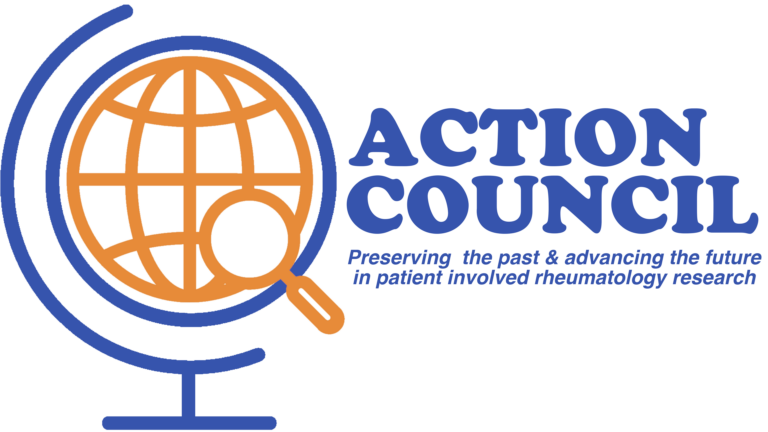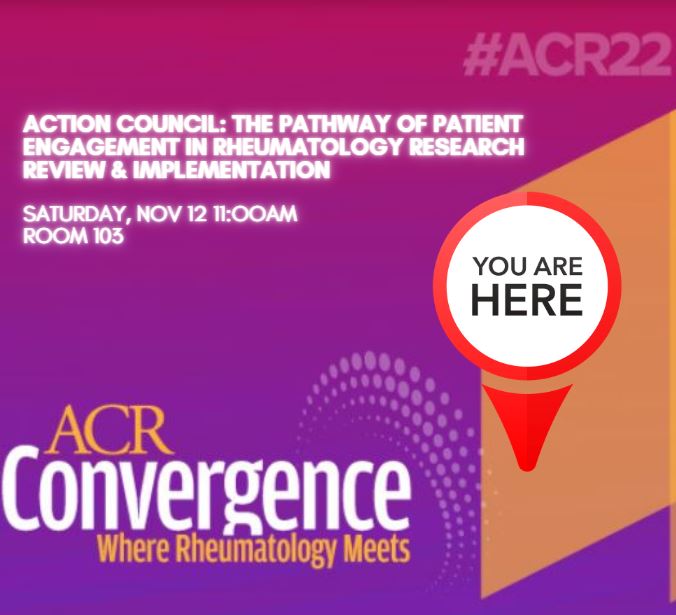Canada Pathway
Canada

Patient Engagement – And We’re Off!
While patient engagement in other disease groups started a decade prior, patient involvement in rheumatology research started in the late 1990’s in Canada and around 2000 in Europe. Partly due to regulatory barriers between patients and pharmaceutical companies at that time, early patient involvement focused strongly on non-pharmacologic research (government, patient organizations, research institutes).
- 1993: Cochrane Musculoskeletal (CM) CM is an international, non-profit organization that aims to help people make well-informed decisions about health care by preparing, maintaining, and promoting reviews on the effects of health care treatments. They produce reliable, up-to-date reviews of interventions for the prevention, treatment, or rehabilitation of musculoskeletal disorders in the form of systematic reviews. CM is also dedicated to making their systematic reviews available to those interested in treatments for musculoskeletal diseases musculoskeletal.cochrane.org formed a Consumer Group (CMSG), enlisting patient systematic reviewers to join health care professionals and researchers belonging to Cochrane. Canada
- As of today, of all registered review groups that make up Cochrane, the CMSG is one of the largest with over 700 active health care professionals, researchers, and consumer representatives from 26 countries.
CoPI: Consumer reviewer
Context of Research: Systematic literature reviews, dissemination (knowledge translation)
Patient research collaboration in rheumatology begins in Canada
- 1998: First self-governed Consumer Advisory Council (CAC)The mission of the Consumer Advisory Council (CAC) is to advocate for consumers and provide for strong public and consumer input in healthcare reform policies in Connecticut. The purpose of the Consumer Advisory Council is to ensure significant consumer participation in the planning and implementation process. portal.ct.gov/OHS/Pages/Consumer-Advisory-Council was established as part of Canadian Arthritis Network/CAN The Canadian Arthritis Network (CAN) is a not-for-profit organization that supports integrated, trans-disciplinary research and development. can.arthritisalliance.ca, the first federally funded arthritis research institute in Canada. After morphing into the Alliance for the Canadian Arthritis Program (ACAP) in 2012, then Alliance for Arthritis in in Canada (ACC), the group was disbanded in 2019.
- 2000: Arthritis Research Canada (ARC) ARC was created in 2000 in recognition of the tremendous potential that research can bring to arthritis treatment in Canada, and indeed, the world. Arthritis Research Canada has earned international attention as a leading arthritis research environment. We have built a strong multi-disciplinary research team of outstanding medical doctors and research scientists, and we willingly collaborate with medical professionals around the world. www.arthritisresearch.ca and established the Arthritis Patient Advisory Board (APAB).The Arthritis Patient Advisory Board (APAB) is comprised of volunteer advocates with arthritis who bring personal experience and arthritis knowledge to research decision making at Arthritis Research Canada. Their goal is to ensure the patient perspective is represented on research matters related to prevention, treatment and self-management of arthritis. Individually and collectively, they communicate research information and findings to arthritis patients, professional organizations and the general public. www.arthritisresearch.ca
- Additionally, Patient Organization, Arthritis Consumer Experts/JointHealthⓇArthritis Consumer Experts/JointHealthⓇ, a national organization that provides free, science-based information and education programs in both official languages to people with arthritis. https://jointhealth.org/ , was established.
CoPI: Advisory panels
Context: Research & Development
Experience working with patients in research leads to guidance for best practices
As a few years have passed since patient engagement in rheumatology began, guidance and recommendations are developed based on lessons learned.
- 2010: Patient Research Partner (PRP): As a result of patient-researcher collaboration with Outcome Measures in Rheumatology (OMERACT) OMERACT is a global community for the development of Core Outcome Sets in the field of rheumatology. Patients participate as research partners in all phases of the research and are equal members in any OMERACT working group.
omeract.org; omeractprpnetwork.orgin 2002, Eueropean Alliance of Associations for Rheumatology European Alliance of Associations for Rheumatology (EULAR) European Alliance of Associations for Rheumatology (EULAR) is the organization which represents the people with arthritis/rheumatism, health professionals (HPR), and scientific societies of rheumatology of all the European nations. The aims of EULAR are to reduce the burden of rheumatic diseases on the individual and society and to improve the treatment, prevention, and rehabilitation of musculoskeletal diseases. To this end, EULAR fosters excellence in education and research in the field of rheumatology. It promotes the translation of research advances into daily care and fights for the recognition of the needs of people with musculoskeletal diseases by the governing bodies in Europe.
eular.org publishes recommendations for patient-researcher collaboration and defines the role of Patient Research Partner (PRP)Patient Research Partner (PRP) is defined as a person with a relevant disease who participates or has participated as an active research team member on an equal basis with professional researchers, thus adding the value of experiential knowledge to a research project.
and defines the role of Patient Research Partner (PRP)Patient Research Partner (PRP) is defined as a person with a relevant disease who participates or has participated as an active research team member on an equal basis with professional researchers, thus adding the value of experiential knowledge to a research project.
De Wit M, et al. European League Against Rheumatism recommendations for the inclusion of patient representatives in scientific projects. Annals of the rheumatic diseases 2011;70(5):722-6.
eular.org Europe - 2010: The University of the West of England (UWE)The University of the West of England (UWE) rheumatology group is involved in projects of regional, national, and global significance.www.uwe.ac.uk rheumatology group publishes a dedicated paper Patient collaboration in the design of Patient-Reported Outcome Measures: Capturing the Experience of Fatigue in Rheumatoid Arthritis
Nicklin J, et al. Collaboration with patients in the design of patient-reported outcome measures: Capturing the experience of fatigue in rheumatoid arthritis. Arthritis Care & Research 2010;62(11):1552-8. on patient-researcher collaboration in the development of a new patient-reported outcome (PRO) for fatigue in rheumatoid arthritis (BRAF). United Kingdom. Measures were updated in 2017.Bristol rheumatoid arthritis fatigue scales (BRAFS) are free to use for clinical or academic reasons.
www1.uwe.ac.uk/ - 2011: European Alliance of Associations for Rheumatology (EULAR) EULAR is the organization that represents the people with arthritis/rheumatism, health professionals (HPR), and scientific societies of rheumatology of all the European nations. The aims of EULAR are to reduce the burden of rheumatic diseases on the individual and society and to improve the treatment, prevention, and rehabilitation of musculoskeletal diseases. To this end, EULAR fosters excellence in education and research in the field of rheumatology. It promotes the translation of research advances into daily care and fights for the recognition of the needs of people with musculoskeletal diseases by the governing bodies in Europe.
www.eular.org establishes the network of Patient Research Partners and develops patient engagement Reference Cards and Background document . Europe
. Europe - 2012: INVOLVEINVOLVE, Establishment 1996 and funded by the National Institute for Health Research (NIHR) to support active public involvement in National Health Services (NHS) public health and social care research. As a national advisory group, the role of INVOLVE is to bring together expertise, insight, and experience in the field of public involvement in research (PIR), with the aim of advancing it as an essential part of the process by which research is identified, prioritized, designed, conducted and disseminated.
www.invo.org.uk publishes updated briefing notes for researchers . INVOLVE notes some of the content is drawn from earlier editions is substantially different in its content, reflecting the changing environment since the original briefing notes were written in 2004. United Kingdom
. INVOLVE notes some of the content is drawn from earlier editions is substantially different in its content, reflecting the changing environment since the original briefing notes were written in 2004. United Kingdom
CoPI: Patient Research Partners (PRPs), Public Involvement in Research (PIR)/Patient and Public Involvement in Research (PPI)
Tools: Recommendations – patient-researcher engagement; Reports – patient researcher engagement; Guidance documents – patient researcher engagement and briefing notes
Context: Guideline development, Patient-reported outcomes (PROs)
Concepts of Patient Involvement (CoPI) change the paradigm for patient engagement in research
- 2011: Strategy for Patient Oriented Research (SPOR): Canadian Institutes of Health Research (CIHR) Canadian Institutes of Health Research played a prominent role in the launch, implementation, and oversight of SPOR, but represents only one in a multitude of partners.cihr-irsc.gc.ca.html establishes a Strategy for Patient-Oriented Research SPOR is a collaboration of researchers, patients, provinces and territories, health care professionals, and others – all working in partnership to integrate research into patient care, ultimately improving the health of Canadians. cihr-irsc.gc.ca (SPOR) to integrate evidence in all levels of the health care system.
- 2012: Patient Research Partner (PRP): Group for Research and Assessment of Psoriasis and Psoriatic Arthritis (GRAPPA) GRAPPA is organized exclusively for non-profit, educational, and scientific purposes, specifically to facilitate the sharing of information related to psoriasis and psoriatic arthritis, networking among different medical disciplines that see psoriasis and psoriatic arthritis patients, and to enhance research, diagnosis, and treatment of psoriasis and psoriatic arthritis.
grappanetwork.org invites Patient Research Partners for the first time. In 2015, a team of Patient Research Partners was permanently added to round out their perspective first report from Patient Research Partner perspective:
De Wit M, Campbell W, FitzGerald O, Gladman DD, Helliwell PS, James J, et al. Patient Participation in Psoriasis and Psoriatic Arthritis Outcome Research: A Report from the GRAPPA 2013 Annual Meeting. The Journal of Rheumatology 2014;41(6):1206-11. - 2013: Core Outcome Measures in Effectiveness Trials (COMET)COMET brings together people interested in the development and application of agreed standardized sets of outcomes, known as ‘Core Outcome Sets’ (COS). These sets represent the minimum that should be measured and reported in all clinical trials of a specific condition, but COS are also suitable for use in routine care, clinical audit, and research other than randomized trials.
comet-initiative.org & the International Dermatology Outcome Measures (IDEOM)(IDEOM) is a non-profit organization seeking to develop and validate measures throughout dermatology with an initial focus on psoriatic disease. They strive for the establishment of patient-centric outcomes to enhance the research and treatment of dermatological conditions. Launched in 2013, IDEOM seeks to bring together physicians, researchers, government agencies, pharmaceutical companies, payers, and patients from around the globe to develop and validate measures throughout the field of dermatology with an initial focus on psoriasis.
dermoutcomes.org collaborate with Outcome Measures in Rheumatology OMERACTOMERACT is a global community for the development of Core Outcome Sets in the field of rheumatology. Patients participate as research partners in all phases of the research and are equal members in any OMERACT working group.
omeract.org to adopt the patient-centered approach of developing core outcome sets with full involvement of patients.
CoPI: Patient Research Partner (PRP), Patient-Centered Outcomes Research (PCOR), Strategy for Patient-Oriented Research (SPOR), conference participant
Context: Clinical trials, assessing grant applications, Core Outcome Set (COS)
As the value of patient engagement evolves, so does guidance and outcome focus
As the decade progresses, international efforts to expand the patient voice in rheumatology research continues. As a result, more programs that focus on patient-reported needs, guidance for involving patients in research, and reports that assess patient involvement emerge.
- 2013: Patient-Centered Outcomes Research Institute (PCORI)PCORI is an independent nonprofit, nongovernmental organization and was authorized by Congress in 2010. PCORI is the largest funder of comparative effectiveness research (CER) in the United States with the mandate to improve the quality and relevance of evidence available to help patients, caregivers, clinicians, employers, insurers, and policymakers make better-informed health decisions. In addition to requiring patient and stakeholder engagement in PCORI funded research, PCORI also engages the public through its own institutional activities, such as Merit Review, which includes patients and stakeholders as reviewers of research applications, ensuring dollars spent are aligned with research outcomes that are meaningful to the patient population. www.pcori.org began the novel funding opportunity, Eugene Washington Engagement Awards ProgramThe Eugene Washington PCORI Engagement Award program, named in honor of the first chair of PCORI’s Board of Governors, is intended to bring more patients, caregivers, clinicians, and other healthcare stakeholders into the research process. The goal is to support projects that will build a community better able to participate in patient-centered outcomes research (PCOR) and comparative clinical effectiveness research (CER) and serve as channels to disseminate study results. www.pcori.org/engagement , which supports projects that will build a community better able to participate in patient-centered outcomes research (PCOR) and comparative clinical effectiveness research (CER) and serve as channels to disseminate study results. Example of award: Matching Actions to Needs: What Matters Most to the Arthritis Community?
 – Arthritis Foundation, United States
– Arthritis Foundation, United States - 2014: Canada’s Strategy for Patient-Oriented Research (SPOR)Endorses the active partnership of patients, researchers, health professionals and decision-makers in research so as to build a sustainable and accessible health care system that optimizes the health of Canadian citizens. cihr-irsc.gc.ca publishes A Resource Guide for Research Teams and Networks
 , a living guide to support researchers, decision-makers and other relevant stakeholders involved in a wide range of SPOR-related activitiesThis resource aims to:
, a living guide to support researchers, decision-makers and other relevant stakeholders involved in a wide range of SPOR-related activitiesThis resource aims to:
1) Clarify key concepts and terms relevant to involving patients in health research such as what we mean by patients, the public and stakeholders, and the different levels and types of involvement, and the rationales and perceived benefits of patient involvement
2) Describe, at a very high level, the current state of the evidence about patient engagement with respect to the effectiveness of different methods in relation
to process and outcome measures
3) Assemble in one place, a selection of resource documents collected from leading patient engagement organizations around the world to provide basic guidance for researchers about principles and methods for involving patients
in health research. - 2014: Group for Research and Assessment of Psoriasis and Psoriatic Arthritis (GRAPPA)Group for Research and Assessment of Psoriasis and Psoriatic Arthritis (GRAPPA) is organized exclusively for non-profit, educational, and scientific purposes, specifically to facilitate the sharing of information related to psoriasis and psoriatic arthritis, networking among different medical disciplines that see psoriasis and psoriatic arthritis patients, and to enhance research, diagnosis, and treatment of psoriasis and psoriatic arthritis.
www.grappanetwork.org publishes Patient Participation in Psoriasis and Psoriatic Arthritis Outcome Research report , co-authored by Patient Research Partners (PRPs)Patient Research Partner (PRP) is defined as a person with a relevant disease who participates or has participated as an active research team member on an equal basis with professional researchers, thus adding the value of experiential knowledge to a research project. After this publication, GRAPPA publishes annual patient reports through 2018.
, co-authored by Patient Research Partners (PRPs)Patient Research Partner (PRP) is defined as a person with a relevant disease who participates or has participated as an active research team member on an equal basis with professional researchers, thus adding the value of experiential knowledge to a research project. After this publication, GRAPPA publishes annual patient reports through 2018. - 2014: Cochrane Musculoskeletal Consumer Group (CMSG)Formed in 1993, enlisting patient systematic reviewers to join health care professionals and researchers belonging to Cochrane. “The feedback provides a layperson’s perspective to complement the feedback provided by our clinical experts.” musculoskeletal.cochrane.org updates recommendations to aid knowledge translation and exchange between clinicians and consumers
 .
.
CoPI: Patient Research Partners (PRPs), Patient-Oriented Research (POR), Patient-Centered Outcomes Research (PCOR)
Tools: Guidance – patient-researcher engagement; Reports – patient researcher engagement, patient engagement, and dissemination; Instruments – patient engagement
Context: Patient-reported outcomes (PROs), Clinical Effectiveness Research (CER)/decision science, dissemination/knowledge translation
Additional frameworks and recommendations for including patients in research
- 2018: INVOLVEINVOLVE was established in 1996 and funded by the National Institute for Health Research (NIHR) to support active public involvement in National Health Services (NHS) public health and social care research.As a national advisory group, the role of INVOLVE is to bring together expertise, insight, and experience in the field of public involvement in research (PIR), with the aim of advancing it as an essential part of the process by which research is identified, prioritized, designed, conducted and disseminated.www.invo.org.uk
produces a set of six draft Standards for Patient Engagement that are currently piloted and evaluated in different areas of health research. United Kingdom
that are currently piloted and evaluated in different areas of health research. United Kingdom - 2018: Canadian Institute of Health Research (CIHR)The Canadian Institutes of Health Research (CIHR) is Canada’s federal funding agency for health research. Composed of 13 Institutes. It collaborates with partners and researchers to support the discoveries and innovations that improve our health and strengthen our health care system.https://cihr-irsc.gc.ca publishes draft Ethics Guidance for Developing Research Partnerships with PatientsThe proposed ethics guidance builds on the SPOR Patient Engagement Framework and, once finalized, could be adapted in various formats by SPOR leads and other initiatives, organizations, and institutions to serve as an educational resource for all those involved in research partnerships with patients.
http://www.cihr-irsc.gc.ca, in support of Canada’s Strategy for Patient-Oriented Research (SPOR)Endorses the active partnership of patients, researchers, health professionals and decision-makers in research so as to build a sustainable and accessible health care system that optimizes the health of Canadian citizens.https:cihr-irsc.gc.ca. The project is a response to ethical issues that were initially identified by the SPOR SUPPORT Unit Patient Engagement Working GroupPatient engagement means fostering a climate in which researchers, health care providers, decision-makers and policy-makers understand the value of patient involvement and patients see the value of these interactions.Engaging patients is an integral component in the development and implementation of all elements of SPOR https://cihr-irsc.gc.ca and reiterated at various conferences and workshops. - 2019: ESCEO (European Society for Clinical and Economic Aspects of Osteoporosis, Osteoarthritis and Musculoskeletal Diseases)ESCEO is a not-for-profit organization, dedicated to a close interaction between clinical scientists dealing with bone, joint, and muscle disorder, pharmaceutical industry developing new compounds in this field, regulators responsible for the registration of such drugs and health policymakers, to integrate the management of Osteoporosis and Osteoarthritis within the comprehensive perspective of health resources utilization.
The objective of ESCEO is to provide practitioners with the latest clinical and economic information, allowing them to organize their daily practice, in an evidence-based medicine perspective, with a cost-conscious perception.
www.esceo.org & World Health Organisation (WHO) publish “Best practice principles for engaging patients in health research, treatment guidelines, and regulatory processesM. de Wit e.a., Principles for engaging with patients in health research, treatment guidelines and regulatory processes: Results of an expert group meeting organized by the World Health Organization (WHO)WHO is the United Nations agency that connects nations, partners and people to promote health, keep the world safe and serve the vulnerable – so everyone, everywhere can attain the highest level of health.www.who.int and the European Society for Clinical and Economic Aspects of Osteoporosis, Osteoarthritis, and Musculoskeletal Diseases (ESCEO), Lancet, April 2019”.
“Best practice principles for engaging patients in health research, treatment guidelines, and regulatory processesM. de Wit e.a., Principles for engaging with patients in health research, treatment guidelines and regulatory processes: Results of an expert group meeting organized by the World Health Organization (WHO)WHO is the United Nations agency that connects nations, partners and people to promote health, keep the world safe and serve the vulnerable – so everyone, everywhere can attain the highest level of health.www.who.int and the European Society for Clinical and Economic Aspects of Osteoporosis, Osteoarthritis, and Musculoskeletal Diseases (ESCEO), Lancet, April 2019”.
CoPI: Strategy for Patient-Oriented Research (SPOR), Patient Involvement in Research (PIR)/Patient and Public Involvement (PPI), working groups
Tools: Guidance documents – ethics
Context: Ethical review, regulatory process, clinical research, guideline development
Establishing measurements of effective patient engagement
2018: Arthritis Research Canada (ARC)ARC was created in 2000 in recognition of the tremendous potential that research can bring to arthritis treatment in Canada, and indeed, the world. Arthritis Research Canada has earned international attention as a leading arthritis research environment. We have built a strong multi-disciplinary research team of outstanding medical doctors and research scientists, and we willingly collaborate with medical professionals around the world. www.arthritisresearch.ca introduces the Patient Engagement in Research Scale (PEIRS)Learn more about the PEIRS tool at:
www.arthritisresearch.ca/peirs/, the first tool of its kind to evaluate the effectiveness of patient engagement in all areas of research. ARC scientists and Patient Research Partners (PRPs) worked together to create this tool.
The tool is designed to measure the degree of meaningful patient engagement in research projects from a patient perspective.
CoPI: Patient Research Partners (PRPs)
Tools: Instruments –patient engagement
Context: Measuring impact
Compensating Patient Partners – Guidance Emerges
Patients, care partners, and patient groups involved in patient engagement activities should be compensated as lived experience experts. Over the years, as more patient voices in research have emerged, various levels of expertise have also evolved. What should you pay these engagement partners for participation in your project?
- 2019: National Health CouncilThe National Health Council provides a united voice for the 160 million people living with chronic diseases and disabilities and their family caregivers. nationalhealthcouncil.org (United States) publishes a Fair-Market Value (FMV) Calculator to determine compensation based on level of expertise. View Patient Engagement Activities Framework document guide
 .
. - 2018: Canadian Arthritis Patient Alliance (CAPA)Canadian Arthritis Patient Alliance (CAPA) works to improve access to medications, health care professionals, and services, Increase patient involvement in arthritis research and policy agendas, and understand and influence research and treatments. arthritispatient.ca and the Rare Disease FoundationRare Disease Foundation is led by rare disease patients, caregivers, researchers, and practitioners who share the same sense of urgency and values about access to resources and research for rare disease patients and their families. rarediseasefoundation.org (Canada) defining core principles behind compensation, outlining how to put those principles into practice in a valid, credible manner that honors and values the contributions of patients and families whether in quality improvement or health research
 .
.
- 2020: Canadian Arthritis Patient Alliance (CAPA) and the Rare Disease Foundation (Canada) publish additional practical recommendations related to compensation
 for Patient Research Partners (PRPs).
for Patient Research Partners (PRPs).
- 2020: Canadian Arthritis Patient Alliance (CAPA) and the Rare Disease Foundation (Canada) publish additional practical recommendations related to compensation
- Some groups, like Outcome Measures in Rheumatology (OMERACT)Outcome Measures in Rheumatology (OMERACT), is a global community for the development of Core Outcome Sets in the field of rheumatology. Patients participate as research partners in all phases of the research and are equal members in any OMERACT working group. omeract.org, omeractprpnetwork.org, are all volunteer organizations. In these cases, when other stakeholders are also donating their time, it is acceptable to expect patient partners to donate their time, too.
CoPI: Patient Research Partners
Tools: Recommendations – compensation
Context: Compensation
Patient Led Guidance to Help Researchers Improve Collaboration
Given patient inclusion as part of the research team has been around, in some cases, for a quarter of a century, those patients who have been involved in these activities for some time help guide researchers on best practices.
- The Saskatchewan Center for Patient-Oriented Research (SCPOR)A partnership of organizations that play a key role in supporting patient-oriented research (POR) across Saskatchewan. SCPOR was formed as part of Canada’s Strategy for Patient Oriented Research (SPOR) implemented by Canadian Institutes of Health Research (CIHR). SCPOR is one of 11 SUPPORT units dedicated to building capacity for patient-oriented research. scpor.ca creates a guide for researchers to consider when starting a patient-oriented research project. This guide was created in conjunction with patient partners and based on items important to them
 .
.
Tags
CoPI: Patient-oriented research
Tools: Guidance – Patient-researcher engagement
Context: Research & Development
1st Scientific Session at ACR to Assist those Designing Patient-Included Rheumatology Research Projects
While patient engagement as partners in rheumatology research has been a staple at scientific conferences in both Europe and Canada for years, until 2022, the topic has had little focus at US-based scientific research conferences.
- 2022: The ACR Convergence meeting features the 1st scientific session of its kind to help attendees improve patient involvement as partners in their research projects. Presentation of this Pathway of Patient Engagement in Rheumatology Research Tool designed by the ACTion Council.
- Attendees – including researchers, rheumatologists, patient research partners, and representatives from scientific societies, patient organizations, and industry – worked together post session to build out the tool to create the most robust repository of patient included rheumatology research to date. (TBD)
Tags
CoPI: Patient Research Partner, conference participant, Co-production of stakeholder groups
Tools: Instruments – Patient-Researcher Engagement
Context: Research & Development










